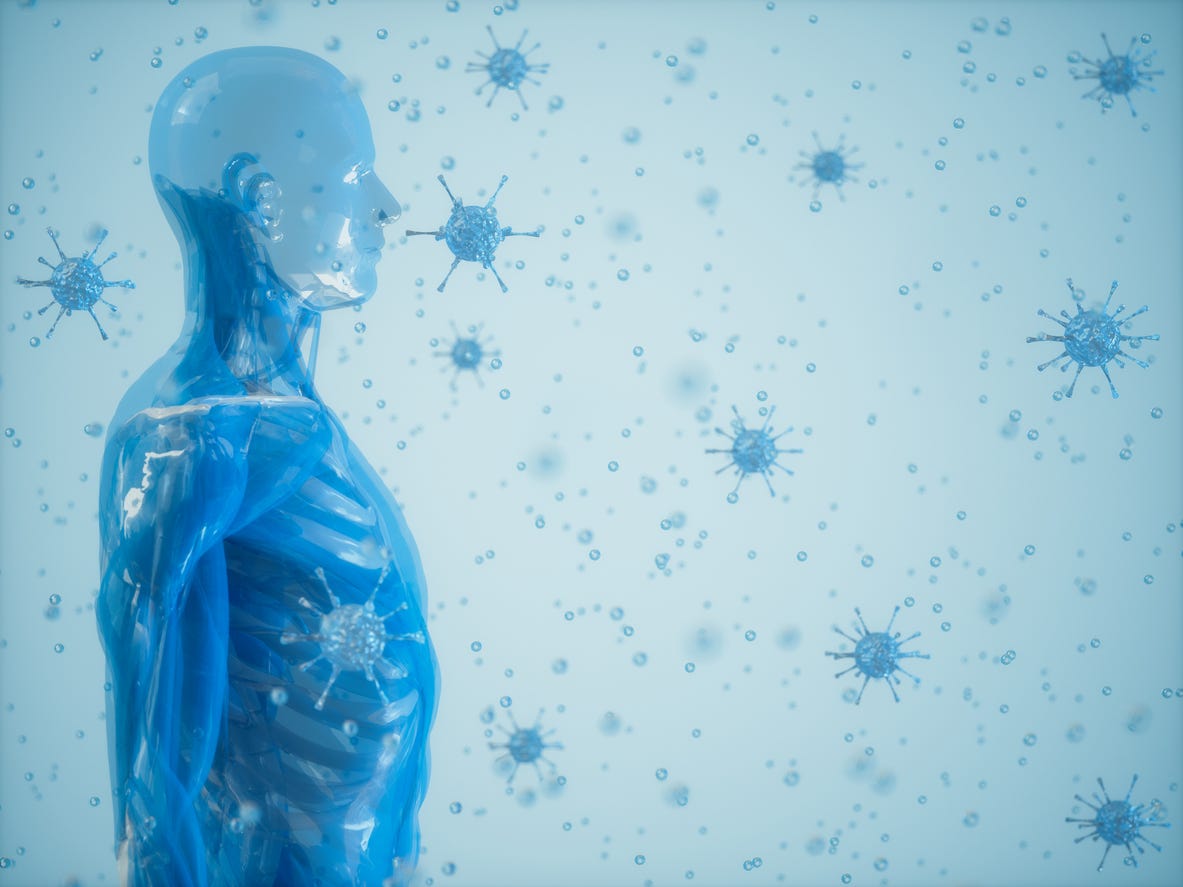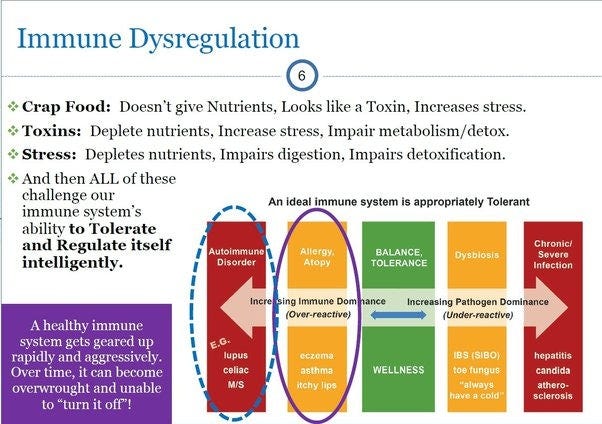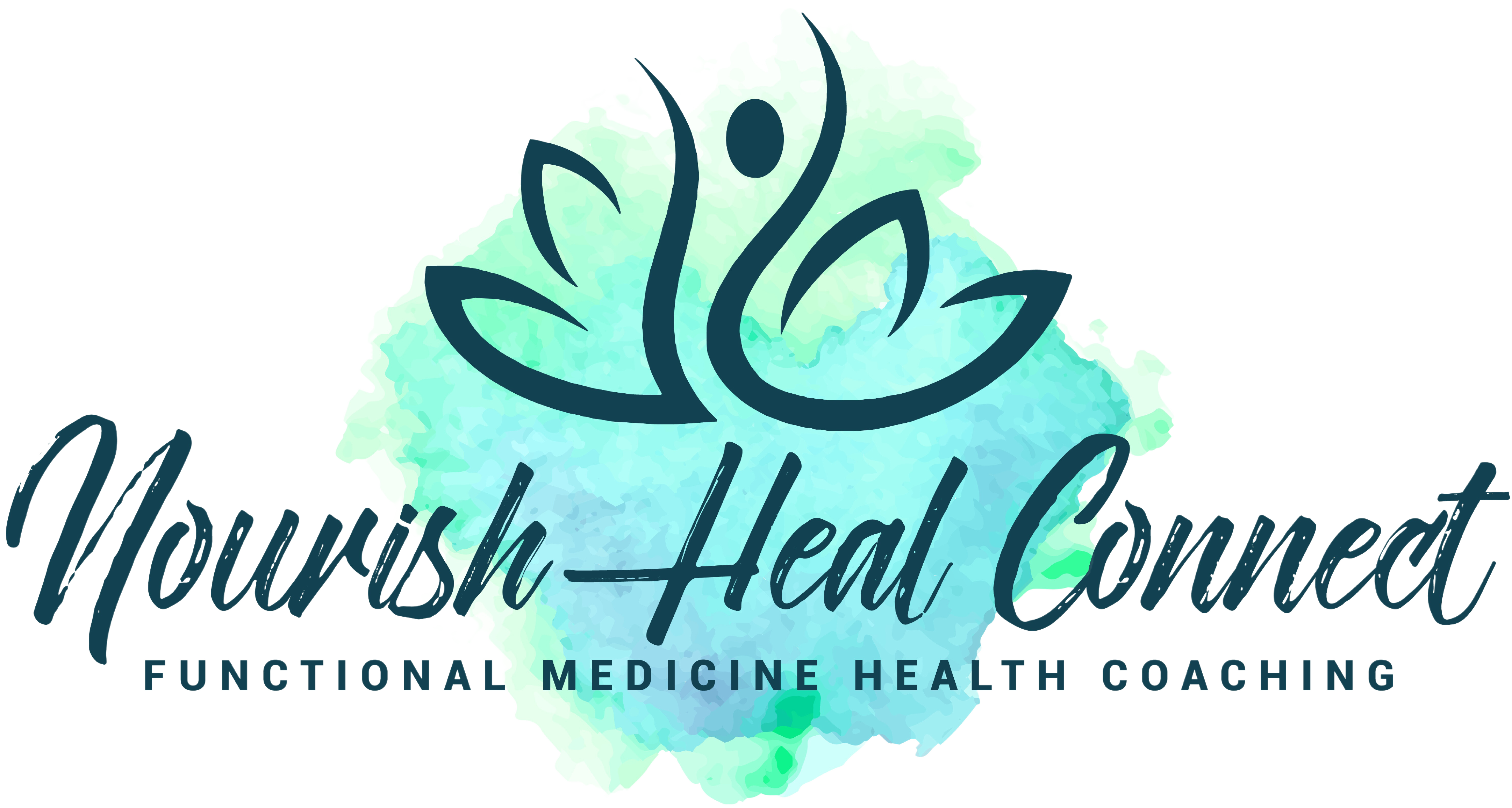Should you try to improve your immune system if you have an autoimmune disease?
Should you boost your immune system if you are dealing with an autoimmune condition?
Autoimmune diseases represent a loss of tolerance to “self”.
When the immune system is still developing, it has to learn how to differentiate what is its own tissue (self) and what is a foreign substance (not self). Tolerance is when our immune system is able to make this distinction.
Diseases of the entire immune system
Autoimmune diseases represent a “category” of diseases with dissimilar names due to which people view these conditions as different illnesses. The symptoms that occur in each illness depend on the particular part of the body that is a victim of the hypervigilant and overactive immune system.
For example, SLE (Lupus) is systemic and affects the entire body. Hashimotos and Graves affect the thyroid gland and Multiple Sclerosis the brain and spinal cord.
The main thing to understand here is that autoimmune disease is a disease of the entire immune system. It needs to be addressed so that it does not find another victim down the line.
This is the reason why most people with one autoimmune diagnosis go on to develop multiple autoimmune diagnoses over time.
If you would like to like to delve deeper into this topic, make sure to check out my free guide here.

What is a healthy immune response?
Our immune system’s primary role is to tolerate and accurately identify a real threat.
What it does NOT do is go berserk or lose its mind. It also does not start attacking our body’s own tissues for no reason whatsoever. When our immune system becomes hypervigilant and overwhelmed, the self regulatory mechanism can become overridden. This leads to chronic autoimmune activation.
In contrast, a healthy immune system is one that can self regulate and have an appropriate and balanced immune response. So it’s not really about how to boost your immune system. Having a healthy immune system is about balance.
This means that it can calm the body (antiinflammatory) and alarm the body (pro-inflammatory) when necessary.
Skewing towards a pro-inflammatory response
Our immune soldiers (white blood cells) have very specific and highly differentiated responses to different kinds of threats. Examples of these are neutrophils, eosinophils and lymphocytes. A healthy immune system quickly mounts a response to a threat by releasing inflammatory chemicals called cytokines.
Then it follows this with an anti inflammatory response to counteract the aggressive response once the threat is over.
However, if the immune system is hyper vigilant and activated for large periods of time, it may become unable to regulate itself and turn off this immune response.
In the case of autoimmunity, there is a skewing towards a proinflammatory response.
One of the main reasons for this is anti inflammatory mediators become proinflammatory mediators as a form of dysregulation.

Source: The School of Applied Functional Medicine
Immune dysregulation and imbalance
There are various ways that the immune system can become dysregulated and imbalanced.
Our immune system is designed to be really strong and keep us safe from any threats, internal and external. This has helped our species survive over millions of years of evolution. But when we lose control over our pro-inflammatory and inflammatory responses, it leads to runaway and rampant chronic inflammation.
An example of an anti-inflammatory mediator is T-reg cells which prevent the immune system from attacking itself. Also, in people with autoimmune conditions, the levels of T-reg cells tend to be lower than what is considered to be optimal. So once again, the focus should not be so much on how to boost your immune system, but rather on how to bring it back to balance.
Other ways that our immune system becomes dysregulated and imbalanced –
- Enhanced intestinal permeability (aka leaky gut) due to a compromised gut barrier function
- Chronically low levels of cortisol lead our immune system to become under reactive or over-reactive to threats
- Molecular mimicry is where the protein component in certain foods or toxins looks similar to a microbe (a threat) that the immune system would respond to. In the case of autoimmune conditions, it’s often human tissue that looks similar to a threat to our immune system
- Lack of nutrients necessary for mounting a healthy immune response (vitamin D, K, A, zinc and others)
Read about the “perfect storm” behind chronic autoimmune activation that I had written about in an earlier post here.
Our overworked police force
Food, toxins and stress are three main factors that contribute to immune dysregulation.
Food
-Low nutrient foods or processed foods filled with artificial colours/flavours and preservatives which are toxic and seem like a threat
-Nutrient poor foods lead to a weak immune system. It also hampers detoxification by reducing the availability of nutrients to an immune system that is already activated and alarmed
-Malabsorption impairs our body’s ability to get the nutrients it needs to activate a healthy immune response to any kind of threat.
Toxins
-Toxins use up a lot of our nutrients. This is because our body has to metabolise these and take them out of our system
-Ingredients in processed foods can look very much like toxins. It can be a physiological stressor as our immune system perceives them to be threats
-Toxins hamper our energy production by damaging our mitochondria (the powerhouse in our cells). It can also impact the ability of our tissues to work properly.
Stress
-Stress (chronic) impairs our ability to digest and absorb our foods leading to poor nutrient absorption.
-It also uses up more of those nutrients trying to break down the stress hormones themselves.
In the case of autoimmune diseases, in particular, all three challenge our immune system which ultimately leads to an inappropriate and overreactive immune response.
It can also lead to a situation where our immune system tries to counteract too many things at the same time and become underreactive to another threat like a viral infection.
In other words, it is like an overworked police force that is stretched out too thin and unable to do its job properly.
In the words of Dr Noel Rose,
“Autoimmunity is our immune system’s attempt to adapt to all the new environmental agents and shifts that we’re being bombarded with every day. It’s an unsuccessful adaptation, but it is our body’s way of trying to fight back.”
For more reading-
Are You Th1 or Th2 Dominant? Effects + Immune Response — SelfHacked
Leaky Gut and Autoimmunity: An Intricate Balance in Individuals Health and the Diseased State
“AUTOIMMUNE DISEASE 101”
A carefully curated and comprehensive collection of carefully selected books, podcasts, websites, blogs, and other resources from the field of Functional Medicine with a focus on autoimmune diseases

If have been looking to get ANSWERS to questions like
-Why do I have this disease?
-Will I get any better?
-Can anyone help me? Nothing is working
-Is there any hope for me to get my life back?
-I am still waiting for a diagnosis, which direction do I need to move towards?
then this GUIDE would a game changer for you!
“Autoimmune Disease 101” is a carefully curated and comprehensive collection of carefully selected books, podcasts, websites, blogs, and other resources from the field of Functional Medicine with a focus on autoimmune diseases.
The Functional Medicine model of care for chronic diseases seeks to answer the question “Why do you have this disease” so that you can get personalised and effective care for your unique condition.
